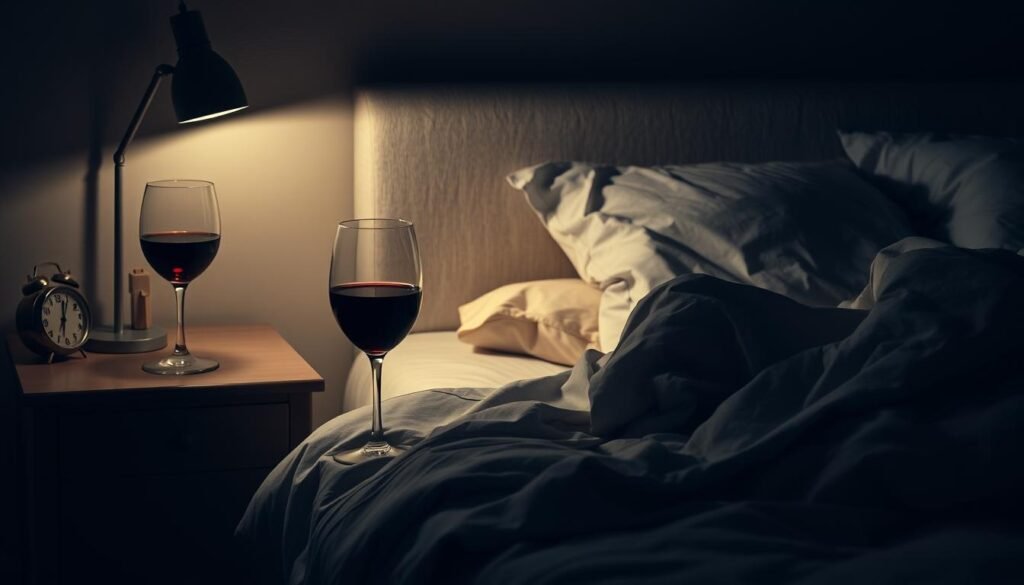Almost 20% of American adults have sleep troubles. This fact is worrying because sleep quality is closely linked to caffeine and alcohol use. Many people drink caffeine to stay awake during the day. They drink alcohol to relax at night. It’s important to know how these affect sleep. Caffeine and alcohol can mess with your sleep. This can lead to not getting enough rest. This affects not just how you sleep but also your overall health.
Key Takeaways
- Caffeine affects sleep quality by disrupting sleep cycles.
- Alcohol may initially induce sleep but leads to fragmented rest.
- Recognizing the impact of these substances can improve sleep hygiene.
- Over 20% of adults struggle with sleep issues related to daily habits.
- Understanding the role of stimulants and sedatives is vital for well-being.
Understanding Sleep Patterns
Sleep is more than just resting; it involves complex stages that help us recover. Knowing about sleep patterns helps improve sleep quality and tackle insomnia.
There are two main kinds of sleep: REM and non-REM. Non-REM sleep has three stages, from light to deep sleep. All these stages help rejuvenate our body and mind. REM sleep, starting after 90 minutes of sleep, is vital for our brains. It helps with understanding memories and managing emotions.
Problems in these stages can make sleep worse and lead to insomnia. Things like caffeine and alcohol disrupt sleep patterns. They make it hard to move smoothly through these important stages.
Knowing about sleep patterns highlights why certain choices affect health. Bad sleep leads to trouble like weak thinking skills and poor decisions. So, it’s important to focus on getting good sleep for our best performance and health.
The Role of Circadian Rhythm
The body’s internal clock, known as the circadian rhythm, controls our sleep-wake cycles. It syncs with light and darkness, affecting our sleep quality. Shift work or lifestyle choices can disrupt this rhythm, leading to sleep problems.
To keep a healthy sleep pattern, understanding the circadian rhythm is key. People working at night face bigger challenges. Their exposure to light at work can mess up their sleep cycle.
This rhythm doesn’t just affect sleep; it plays a role in our body’s metabolic functions too. A regular rhythm helps keep our energy stable through the day. If it gets disturbed often, it can impact our thinking and how we feel overall.
Regarding caffeine, studies show it can delay our natural sleep signals by about 40 minutes. This research underlines how outside elements affect our sleep. It shows how important it is to follow our internal sleep clock for good rest.

How Caffeine Affects Sleep Quality
Caffeine is a stimulant for our central nervous system. It can mess with our sleep big time. It stays active in our body for up to six hours. So, drinking it later in the day can really make it tough to catch some z’s. People who sip on coffee or tea in the afternoon or evening often struggle. They find it hard to drift off or stay asleep, lowering their sleep quality.
The Stimulant Effect of Caffeine
The stimulant effects of caffeine can mess with our natural sleep cycle. Drinking it regularly can make you more alert. But, it can also make it hard to wind down at night. Many studies back this up, showing why it’s important to watch when you have caffeine. It’s key to know how your own body reacts. Then you can adjust when you drink caffeine to avoid it keeping you up.
Caffeine’s Impact on Melatonin Levels
Studies show that caffeine can slow down the making of melatonin. That’s the hormone that helps us sleep. When melatonin levels drop, our sleep cycle gets thrown off, making it tough to fall asleep. With more people understanding how caffeine delays melatonin, it becomes clear. We should keep an eye on our caffeine habits to sleep better. Plus, having a bedtime routine that promotes sleep can help fight off caffeine’s effects. Want to know more about how caffeine affects your sleep? Check out this deep dive here.

| Caffeine Consumption Time | Potential Impact on Sleep Quality |
|---|---|
| Morning | Minimal impact if consumed moderately |
| Afternoon | May begin to affect the ability to fall asleep |
| Evening | Significant impairment on sleep onset and duration |
| Late Night | Severe disruption of sleep quality |
The Influence of Alcohol on Sleep
Alcohol can affect your sleep. Many think it helps fall asleep faster. Yet, this is often misleading and may disrupt sleep later.
Alcohol as a Sedative
Alcohol initially helps you relax and feel sleepy. But, this effect is temporary. After the body processes the alcohol, your sleep quality drops, leading to frequent wake-ups. It feels like you slept well but you wake up tired.
Sleep Cycles Disrupted by Alcohol
Studies show alcohol messes with your sleep cycles. It especially harms the REM sleep stage, which is key for thinking and emotion. This disruption makes sleep less refreshing, worsening overall sleep quality.
Drinking often increases chances of waking up at night. Research connects heavy drinking with poor sleep quality. Over time, using alcohol to sleep can risk developing persistent sleep problems, adding to sleep troubles.

Sleep Deprivation and Its Consequences
Sleep deprivation greatly impacts our health and well-being. It makes us feel extremely tired, affecting how we do everyday tasks. This tiredness can lead to more health problems. People with insomnia often feel more anxious and depressed. This makes it tough to enjoy life.
Not getting enough sleep doesn’t just hurt our minds; it can harm our hearts too. People who don’t get enough sleep face more heart issues. Our bodies need sleep to stay healthy. Without it, we could face serious health problems.
Insomnia’s effects build up over time. Lack of sleep hurts how well we think and perform physically. It’s crucial to see how our choices affect our sleep. Drinking too much coffee or alcohol can make sleep problems worse. These substances can mess up our sleep, leading to a cycle of trying to feel better without fixing the real issue. Knowing how alcohol and caffeine affect our sleep is the first step in getting better.
For more details about how caffeine and alcohol influence sleep quality, read here.
Caffeine and Alcohol on Your Sleep Patterns
Caffeine and alcohol deeply impact how we sleep. They affect our body’s normal sleep cycle. This can lead to trouble sleeping well and less sleep. Drinking caffeine in the afternoon or evening might delay when you fall asleep. It keeps your brain awake and lowers melatonin, which we need for sleep.
Alcohol might make you feel sleepy at first. But this feeling can trick you. As hours pass, your sleep won’t be as good. Alcohol disturbs how we sleep, especially reducing REM sleep. REM sleep is vital for thinking clearly and for emotional health. Mixing caffeine and alcohol makes sleep even more unpredictable and unsatisfying.
To sleep better, it’s important to watch how much caffeine and alcohol you have. Here’s a table showing their effects on sleep:
| Substance | Initial Effect | Long-term Impact | Recommended Intake |
|---|---|---|---|
| Caffeine | Increased alertness | Delayed sleep onset, reduced sleep quality | Avoid after 2 PM |
| Alcohol | Initial sedation | Disrupted sleep cycles, reduced REM sleep | Limit to 1-2 drinks |
Knowing how caffeine and alcohol affect sleep helps us choose better. By managing these substances, we can sleep better. This leads to feeling better overall.
Recognizing Symptoms of Sleep Disorders
Knowing the signs of sleep disorders is key for good health. Insomnia is a major one, and it shows up as not being able to fall or stay asleep. Because of this, you might feel really tired during the day and find it hard to pay attention to tasks.
- Frequent waking during the night
- Non-restorative sleep
- Irritability or mood swings
- Memory problems
These symptoms show why it’s essential to look at how we live our lives. Things like how much coffee or alcohol you drink can greatly affect your sleep. If these issues don’t go away, getting help from a professional is smart. They can offer ways to better manage the problem that fit you best.
Managing Caffeine and Alcohol Intake
To get better sleep, it helps to manage caffeine and alcohol well. Start with setting a regular sleep schedule. This helps your body recharge the right way. Stop having caffeine at least six hours before bed to sleep better.
Creating Healthy Sleep Habits
A calm routine before bed can make sleep better. Try meditation, reading, or some gentle stretching to relax. Eating healthy is also key. Foods that are good for you help your overall health, including sleep. Choose herbal teas at night over drinks with caffeine.
Setting Boundaries for Stimulants and Sedatives
Setting personal limits on stimulants and sedatives is important. Know how your body reacts to them. This helps improve your sleep. While alcohol might seem relaxing at first, it can wreck your sleep later. Look for other ways to unwind for better sleep. For more tips on sleep improvement, visit this resource.